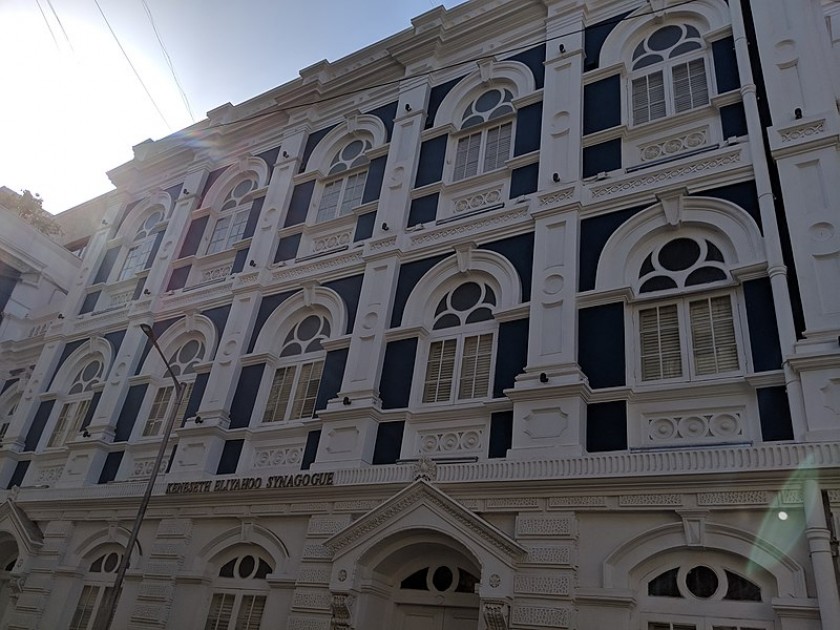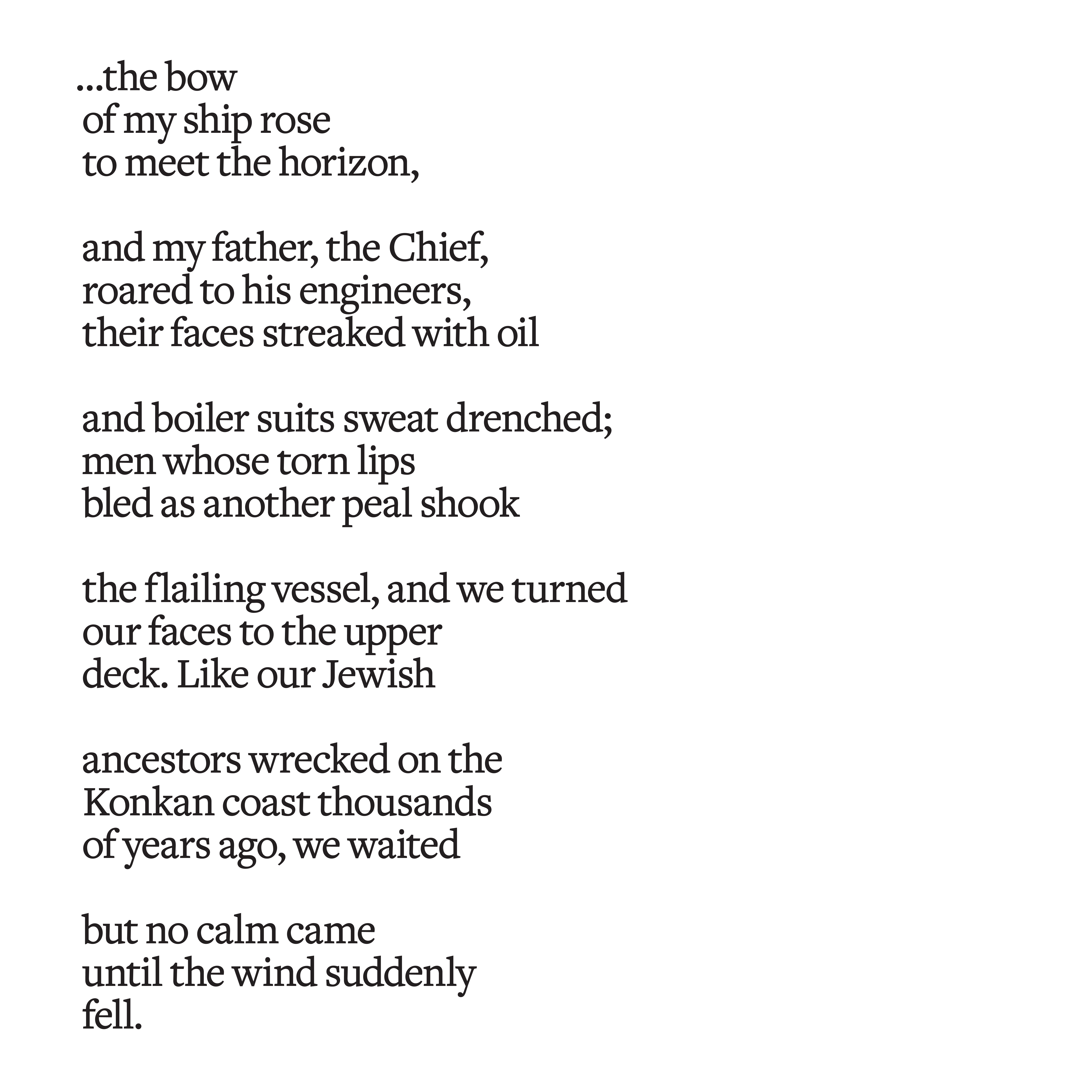Join a community of readers who are committed to Jewish stories
Sign up for JBC’s Nu Reads, a curated selection of Jewish books delivered straight to your door!

| Kneset Eliyahoo Synagogue in Mumbai, India |
Photo by Kushared
“Voyage” is the opening poem of my book In Our Beautiful Bones. It sets the scene for the book, giving readers a glimpse into my journey and history. The epigraph refers to the Upanishads, and the ear as a vessel for divine messages.
In “Voyage” I describe a thunderstorm in which my car was nearly washed off the road. A bolt of lightning hit somewhere close by and the clap of thunder that followed was deafening. Paralyzed by terror for a few moments, I was lifted out of my body, and left suspended, and then suddenly, I was back. At that moment, thoughts of my father who was a marine engineer in Bombay — who had sailed from the days of the steam ship to Diesel vessel — rushed in. The storms he had weathered on the high seas flashed through my mind, connecting me to him in a strange new way, as if some secret knowledge had been transferred to me. I sensed that I was also being reminded of my ancestors’ journey from somewhere in the Middle East to India.

I was born in Mumbai, and lived in Kolkata, India, before immigrating to the US. My ancestors, who were called Shanwar telis—Saturday Oil Pressers, (tel is the Marathi word for oil, teli, one who presses oil) as that was the profession many took up. Since they did not work on shanwar—Saturday, the Sabbath– they were called Shanwar tellis. Many theories about the origins of the Bene Israel exist. One theory of their arrival is that two ships were shipwrecked on the west coast of India in 175 BCE. The survivors settled in villages and made a new life for themselves.
Another theory is the belief that seven men, or seven couples survived a shipwreck. Some think they came after the destruction of the Temple in 70 CE, others believe that they were descendants of the Lost Tribes who came around the tenth century, perhaps around King Solomon’s reign.
The most popular theory is that they were fleeing the rule of the Greek overlord Epiphanes in 175 BCE. However, scholars agree these ancestors of mine came from Yemen, Persia, or South Arabia in the fifth or sixth century CE.
The new arrivals, who had lost everything, were peacefully allowed to settle and travel. They adopted Indian ways, clothes, foods, and kept the Sabbath; except for the Shema, and a few other prayers, they did not practice most rituals. When this community was discovered by missionaries it was found they did not know of the existence of Hanukkah. This helped scholars argue that they had arrived before the second century.
The Bene Israel, the oldest Jewish community in India, have their own identity and unique history. I can only imagine their struggles and fears, as they began to reinvent themselves among strangers. In India they were never persecuted, and it became their home. Their descendants have thrived in India and wherever in the world they immigrated, making their mark in every profession — literature, art, music, dance, science, social work, Hollywood and Bollywood, and the military just to name a few.
I immigrated to the US with my husband when we were in our mid-thirties, and it was a difficult time. My journeys — physical, spiritual, and personal journeys all influence my writing — sometimes in inexplicable ways. Exploring, searching, and learning are in my psyche due to the openness with which I was brought up. I devoured world epics, folktales, literature, mythology, and — because India was colonized for two-hundred years by the British — I was influenced by British literature as well; likewise, I was impacted by American culture, particularly music and film. Animals, wildlife, fish, birds, and nature play a significant role in my life.
My larger-than-life father, Solomon (Sunny) Aaron Joseph, my quiet and gentle mother Ruby, had a great impact on me. Their deaths shook me deeply and I bring my parents to life again in my poems.
My first chapbook, Lands I Live In, reflects my challenges as an immigrant in the US. My second book, What Dread, is informed by science, mythology, and psychology and focuses on darker sides of animal and human nature. My third book, Sparrows and Dust, wrestles with memory and grief using bird images, intertwined with Christian, Judaic, and Sufi philosophies. My first full-length book, Sharp Blue Search of Flame, grapples with death, loss, violence, women’s struggles, and weaves in ideas from various religions, mythologies, and literature. Displacement, otherness, colonialism, and racism, layer my work in complex ways. In my latest book, In Our Beautiful Bones, I use hybrid forms, to examine these subjects, as well as brutality against people of color, prejudice, oppression, and argue with America, where democracy fights for survival. My books have been nominated for and awarded several prizes.
Life in a new land is never easy, we have to educate, break barriers and fight to be heard:

Who we are, where we come from, our search for justice becomes even more poignant as we battle for dignity and safety in a more dangerous world:

This piece is a part of the Berru Poetry Series, which supports Jewish poetry and poets on PB Daily. JBC also awards the Berru Poetry Award in memory of Ruth and Bernie Weinflash as a part of the National Jewish Book Awards. Click here to see the 2021 winner of the prize. If you’re interested in participating in the series, please check out the guidelines here.
Zilka Joseph was born in Mumbai, and lived in Kolkata. Her work is influenced by Indian/Eastern and Western cultures, and her Bene Israel roots. She has been nominated several times for a Pushcart, and for a Best of the Net, has won many honors, participated in literary festivals and readings, and has been featured on NPR/Michigan Radio, and several international online interviews and journals. Her work has appeared in Poetry, Poetry Daily, The Writers’ Chronicle, Frontier Poetry, Kenyon Review Online, Michigan Quarterly Review, Beltway Poetry Review, Asia Literary Review, Poetry at Sangam, The Punch Magazine, Review Americana, Gastronomica, and in anthologies such as 101 Jewish Poems for the Third Millennium, The Kali Project, RESPECT: An Anthology of Detroit Music Poetry, Matwaala Anthology of Poets from South Asia (which she co-edited), Cheers To Muses: Contemporary Works by Asian American Women, Uncommon Core: Contemporary Poems for Living and Learning, and India: A Light Within (a collaborative project). She was awarded a Zell Fellowship (MFA program), the Michael R. Gutterman award for poetry, and the Elsie Choy Lee Scholarship (Center for the Education of Women) from the University of Michigan. Her previous Mayapple books are Lands I Live in (2007) and In Our Beautiful Bones (2021). Zilka teaches creative writing workshops in Ann Arbor, Michigan, and is a freelance editor, a manuscript coach, and a mentor to her students.